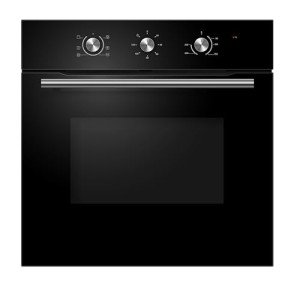Built In Electric Cooker's History Of Built In Electric Cooker In 10 Milestones
Understanding Built-In Electric Cookers: A Comprehensive Guide
The contemporary kitchen has progressed for many years, embracing technology that intends to simplify cooking while enhancing performance. Among the most ingenious appliances that have actually gained appeal is the built-in electric cooker. This post explores the functions, benefits, and factors to consider when selecting built-in electric cookers. It will likewise address common questions, supplying an in-depth check out their functionality and influence on kitchen design.
What is a Built-In Electric Cooker?
A built-in electric cooker is an integrated cooking home appliance designed to fit seamlessly into kitchen cabinets. Unlike freestanding models, these cookers are permanently installed in the kitchen, providing a built-in visual. They can be found in various types, including ovens, hobs, and mix units, and normally use electrical power as the main heat source.
Kinds Of Built-In Electric Cookers
The category of built-in electric cookers can be broken down into numerous categories:
Type
Description
Built-In Ovens
Integrated cooking systems used for baking, roasting, etc.
Electric Hobs
Flat cooking surface areas with heating aspects for stovetop cooking.
Combi Ovens
Mix units that work as both a microwave and a standard oven.
Steam Ovens
Ovens designed to prepare food with steam, protecting nutrients and flavors.
Benefits of Built-In Electric Cookers
Built-in electric cookers use numerous benefits that make them a popular option amongst house owners and culinary lovers alike. Here are some key advantages:
Space Efficiency: Built-in electric cookers conserve counter space, making them perfect for smaller kitchens where optimizing space is important.
Aesthetic Appeal: These cookers provide a smooth and sleek aim to the kitchen. Their integrated design boosts the general cabinets, contributing to a contemporary aesthetic.
Enhanced Functionality: Many built-in electric cookers included advanced features such as digital controls, self-cleaning alternatives, and wise innovation for remote tracking.
Enhanced Safety: Built-in models typically have security functions such as vehicle shut-off and kid locks, making them safer in environments with children.
Flexibility: From stove to induction hobs, built-in electric cookers offer diverse cooking alternatives, catering to different culinary needs.
Factors to consider Before Installing a Built-In Electric Cooker
While built-in electric cookers bring lots of benefits, some considerations must be considered before buying:
Installation Requirements: Built-in cookers often require professional setup, which may include electrical modifications.
Cost: These designs normally come at a higher cost point than portable appliances, both for the units themselves and setup.
Restricted Mobility: Once installed, built-in electric cookers can not be quickly moved, which can be a downside for those who may move frequently.
Compatibility: Homeowners require to make sure that their kitchen space supports the particular dimensions and electrical requirements of the cooker.
Installation and Maintenance
Correct installation and maintenance are vital to make sure optimal performance and durability of built-in electric cookers. Here are some steps and suggestions:
Installation Process
Measurement: Measure the designated location in the kitchen to ensure the cooker fits properly. Think about the height, depth, and width of the device.
Electrical Setup: Check if existing electrical work fulfills the cooker's power requirements. This might include consultation with an electrical contractor.
Ventilation: Ensure the kitchen has suitable ventilation if the cooker requires it.
Follow Manufacturer Instructions: Always stick to the maker's setup instructions to prevent guarantee problems.
Maintenance Tips
Regular Cleaning: Keep the cooker clean by quickly cleaning spills and food residues. Self-cleaning alternatives can also be utilized when readily available.
Inspect Seals and Gaskets: Inspect the door seals frequently to ensure they are in good condition, preventing heat loss and improving effectiveness.
Expert Servicing: Schedule expert upkeep checks to ensure all elements are operating correctly and deal with any concerns.
Regularly Asked Questions (FAQs)
What is the life-span of a built-in electric cooker?
The life-span of built-in electric cookers normally ranges from 10 to 15 years, depending on usage and maintenance.
Can a built-in electric cooker be repaired?
Yes, lots of built-in electric cookers can be repaired. Nevertheless, the repair work expenses can be considerable, so it's necessary to weigh the expense of repair work against replacement.
Are built-in electric cookers energy-efficient?
Built-in electric cookers can be energy-efficient, specifically models with energy-saving features such as induction innovation or smart heating aspects.
Do built-in electric cookers need specific kitchen cabinetry?
Yes, built-in cookers need to be set up in kitchen cabinetry created to accommodate them, making sure correct ventilation and support.
How do I select the ideal built-in electric cooker for my needs?
Consider your cooking practices, kitchen area, and preferred functions. It's advantageous to check out reviews and seek advice from kitchen appliance specialists while making a decision.
Built-in electric cookers represent a combination of performance and beauty in modern-day kitchen design. view it boost the cooking experience while matching the total visual of the kitchen. As with any significant device investment, understanding the advantages, factors to consider, and maintenance involved is crucial for making an informed decision. By including a built-in electric cooker, homeowners can change their culinary adventures and develop enduring impressions in their kitchen areas.
